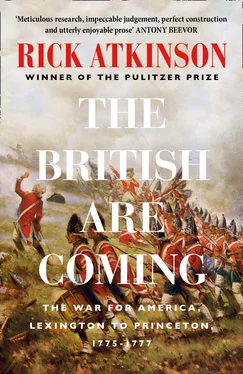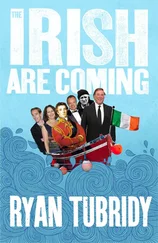As for fighting the rebels on land, Germain relied heavily on General Howe’s assessment. An unconventional enemy required original tactics, and Howe’s experience with light infantry and irregular warfare—fighting from “trees, walls, or hedges”—seemed apposite. The commanding general favored squeezing New England between the blockaded ports and the North River, also known as the Hudson, with an offensive launched into New York from Canada once the American interlopers were expelled from Quebec. Germain agreed: a robust fleet must be dispatched to the St. Lawrence, and another to Boston or New York. He immediately pressed the Admiralty to find sufficient ships not only in Britain, but also in Germany and Holland. More combat troops must also be found, from Scotland, Ireland, and the little German principalities.
Germain also knew that for the past two months, the king had been intimately involved in planning another expedition—to the southern colonies, where Scottish émigrés in North Carolina were “said to be well inclined” to the Crown. Within three days of taking office, Germain had adopted this adventure as his own. On the king’s command, seven infantry regiments were to embark in Cork on December 1, with orders “to assist in the suppression of the rebellion.” By late November, His Majesty was informed that Howe and the southern governors had been given authority to raise loyalist troops who would receive British arms and be paid as much as regulars. A commodore, the capable Sir Peter Parker, would escort the expedition to the southern colonies with nine warships and fifteen hundred crewmen. The Admiralty ordered Hawke to Cape Fear on the North Carolina coast to recruit local pilots—with press warrants, if necessary—and to scout for landing sites.
All this was to be “a profound secret,” although, as usual, American agents in London learned of the plan immediately. An assault on the southern colonies would hardly come as a surprise. A recent proposal in the Commons—rejected for the moment—called for sending British regiments to foment slave uprisings, and Governor Dunmore in Virginia had declared that “it is my fixed purpose to arm all my own Negroes and receive all others that will come to me whom I shall declare free.”
Zeal, indeed, would be a hallmark of George Germain’s ministry. More aggressive than his generals, he intended to send them even more reinforcements than they had requested. Howe, facing a grim winter in Boston, praised “the decisive and masterly strokes … effected since your lordship has assumed the conduct of this war.” The American secretary’s moxie was so striking that even the opposition Evening Post predicted he would rise still further in his remarkable rebound to eventually become prime minister. The king was said to be pleased.
Yet amid the green baize desks and the exquisite wall maps in Whitehall, certain truths about the American war remained elusive. Neither Germain nor anyone else in government had carefully analyzed whether Britain’s troop transports, storeships, men-of-war, and other maritime resources could support an ambitious campaign that now included ancillary assaults in the far south and the far north. Little coordination was imposed on one commander in chief in Canada or another in Boston, or with their naval counterparts. Subordinate generals were permitted, even encouraged, to offer their views directly to policy makers in London. Swayed by loyalist exiles and vindictive Crown officials in the colonies, king and cabinet continued to overestimate the breadth and depth of loyal support. No coherent plan obtained to woo the tens of thousands who straddled the fence in America, or to protect those who rejected insurrection but risked severe retaliation from the rebels.
Finally, Germain, like the best of kings he served, could neither grasp the coherence and appeal of revolutionary ideals, nor comprehend the historical headwinds against which Britain now tacked. The American secretary’s lack of “genius sufficient for works of mere imagination” had been acknowledged ironically; that irony would haunt the rest of his days. For now, in a private letter to Howe, he praised the “cordiality & harmony which subsists between you, Clinton, & Burgoyne.” He added:
We want some good news to encourage us to go with the immense expense attending this war.… The providing [of] armies at such a distance is a most difficult undertaking. I do the best I can, and then we must trust to Providence for success.
7.
They Fought, Bled, and Died Like Englishmen
NORFOLK, VIRGINIA, DECEMBER 1775
John Murray, the fourth Earl of Dunmore and the royal governor of Virginia, had few rivals as the most detested British official in North America. Now forty-five, he was a short, pugnacious Scot whose father had been arrested for treason in the 1745 Jacobite rising. Young John subsequently chose to serve the English Crown as a soldier and was permitted to inherit the title after his father’s death in 1756. His estates in Perthshire provided £3,000 annually, but the fourth earl had accumulated both eleven children and expensive tastes. He hired the eminent artist Joshua Reynolds to paint his portrait, in tam-o’-shanter and highland tartans; he also built a summer house with an enormous stone cupola shaped like a pineapple, later derided as “the most bizarre building in Scotland.” Finding himself in financial straits, Dunmore sought to enlarge his fortune abroad. Appointed governor of New York in 1770, he had no sooner arrived than London reassigned him to Virginia, a disappointment that sent him stumbling through Manhattan streets in a drunken rage, roaring, “Damn Virginia … I’d asked for New York.” One loyalist reflected, “Was there ever such a blockhead?”
Virginians later caricatured Dunmore as an inebriated, arrogant philanderer, but he brought to Williamsburg one of America’s largest libraries, an art collection, and assorted musical instruments as evidence of his refinement. He also brought an unquenchable appetite for land, claiming vast tracts between Lake Champlain and what would become Indiana. His popularity surged briefly in 1774 after he launched a punitive military expedition against Shawnee Indians inconvenient to white Virginians who also coveted western acreage. But revolutionary upheaval soon unhorsed him.
Ever since John Rolfe, husband of a young Indian woman named Pocahontas—renamed Rebecca after her conversion to Christianity—learned to cure native tobacco in the early seventeenth century, the crop had dominated Virginia’s economy. The thirty-five thousand tons exported annually from the colony by the early 1770s had brought wealth but also more than £1 million in debt, nearly equal to that of the other colonies combined and often incurred by Tidewater planters living beyond their means. Agents for Glasgow and London merchant houses now controlled most of the tobacco yield. Resentment against British imperial constrictions combined with other colonial grievances, and was compounded by anxiety over the loss of local autonomy. Rebel leaders persuaded Virginians that rebellion “would enhance their opportunities and status,” the historian Alan Taylor later wrote, while also safeguarding political liberties threatened by an overbearing mother country. Planter aristocrats—like the Washingtons, Lees, and Randolphs—helped lead the uprising, but only by common consent. Moreover, evangelical churches, notably the Baptists and Methodists, were promised elevated standing “by disestablishing the elitist Anglican Church” favored by Crown loyalists.
When, in May 1774, Dunmore dissolved the fractious Virginia assembly, the House of Burgesses, delegates simply moved down the street from the capitol to reconvene in the Apollo Room of the Raleigh Tavern, subsequently forming the Virginia Convention to oversee colonial affairs. Anger deepened; resistance grew general. The colony became a leader in boycotting British goods and in summoning the Continental Congress to Philadelphia. Courts closed. Militia companies drilled. The Virginia Gazette published the names of loyalists considered hostile to liberty; some were ordered into western exile or to face the confiscation of their estates. “Lower-class men who did not own property saw the break from Britain as a chance to gain land and become slaveholders,” the historian Michael Kranish would write.
Читать дальше












